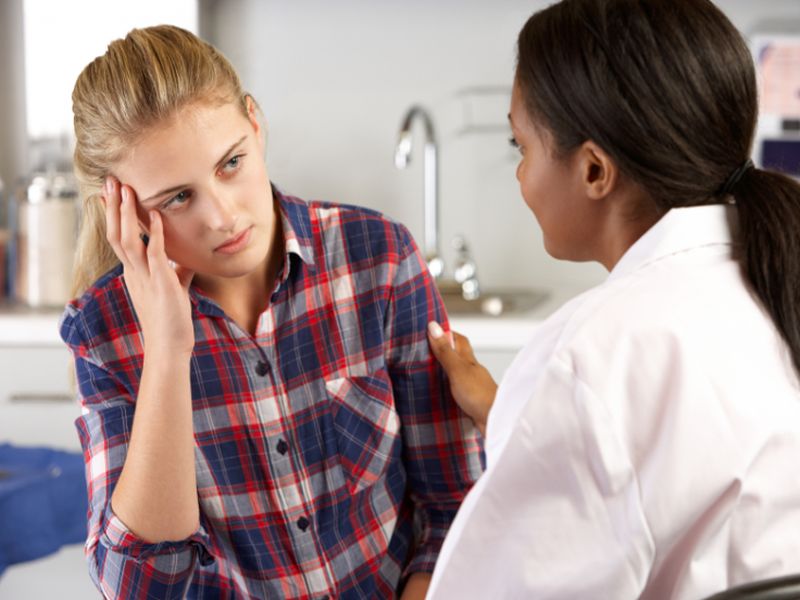

Pediatricians Revise Guidelines for Teen Victims of Sexual Assault
Physicians need to be comfortable screening for it, offering additional help if neededMonday, February 27, 2017

MONDAY, Feb. 27, 2017 (HealthDay News) -- Pediatricians should be comfortable with treating and screening for sexual assault -- and they should know where to send their teenage patients for any additional help they might need.
Those are some of the major points in updated recommendations from the American Academy of Pediatrics (AAP) on helping teens who've been sexually victimized.
The last time the group published guidelines on the issue was 2008. Since then, the problem of sexual assault -- particularly on college campuses -- has gained more public attention, explained Dr. Elizabeth Alderman, lead author of the new recommendations.
In 2014, she noted, a White House task force issued a report calling on colleges to ramp up efforts to combat sexual assaults.
Of course, sexual assault is not limited to college campuses, said Alderman, who is an adolescent medicine specialist at Children's Hospital at Montefiore in New York City.
Pediatricians have a role to play in both the aftermath of sexual assault and in helping to prevent it, she explained.
"It's extremely important for pediatricians to be prepared for this," Alderman said.
The updated guidelines, published online Feb. 27 in the journal Pediatrics, advise pediatricians on how to care for a patient in the more immediate aftermath of an assault.
But they also encourage doctors to routinely ask their teenage patients if they have ever been victimized. If the answer is yes, pediatricians should be ready to refer kids and their families to any community services, the guidelines state.
And, Alderman noted, "the doctor should acknowledge in some way that it's great [the patient] told someone."
The idea of screening kids about sexual victimization is sound, according to Kristen Houser, of the National Sexual Violence Resource Center in Enola, Pa.
"But you need to know how to talk about it. The way you phrase the questions is important," said Houser, who was not involved in the AAP recommendations.
Asking a teenager if she's ever experienced "sexual violence," for instance, is probably not the best way to get the true answer, according to Houser. Asking clearer questions, in language kids understand, will be more effective.
"You're much more likely to get an answer when you have a rapport," Houser said.
It's also critical, she said, that pediatricians be connected to local services for sexual assault victims. Those are resources victims will need beyond medical care -- including help with the legal system and the long-term recovery from sexual assault.
"Learn about your community's rape crisis center, and the local child advocacy center. Talk with them," Houser said. That way, she added, pediatricians won't just be "handing patients a brochure," but connecting them with a resource they know.
Brian Pinero is vice president of victim services for the Rape, Abuse and Incest National Network (RAINN).
He agreed that "how" doctors ask questions and make referrals is key.
"They can tell [patients], 'This is how this resource can help you,' but make sure they know it's their choice. No one is forcing them," Pinero said.
"What's important is that victims know they are believed and that someone cares," he added.
When patients do need mental health care, Houser said it's best that they see a professional with experience in dealing with trauma.
And it's not only teens who may need that help. "Parents may need help working through feelings of anger, or blame, or guilt," Houser pointed out.
According to RAINN, the rate of sexual assault in the United States has fallen 63 percent since 1993. Despite the improvement, a sexual assault happens every 98 seconds nationwide.
Teenagers and young women are at particular risk. College-aged women -- aged 18 to 24 -- are three to four times more likely to be sexually assaulted, compared with U.S. women as a whole, according to RAINN.
Because of that, Alderman said, the "pre-college visit" to the doctor is an important one.
That's when doctors can talk to teens about staying safe after they head off to school, she said.
One important topic, according to Alderman, is drinking. Alcohol, the AAP says, "is by far the most common date-rape drug."
Still, sexual violence can affect anyone, at any age. So, Alderman said, parents and kids need to have an "ongoing conversation" about the issue.
Houser said that should start early, and include things like not forcing your child to give hugs if she or he doesn't want to.
"Kids should learn that it's their right to control who touches their body, where and when," she said.
SOURCES: Elizabeth Alderman, M.D., adolescent medicine specialist, Children's Hospital at Montefiore, and professor, clinical pediatrics, Albert Einstein College of Medicine, New York City; Kristen Houser, chief public affairs officer, National Sexual Violence Resource Center, Enola, Pa.; Brian Pinero, vice president, victim services, RAINN, Washington, D.C.; Feb. 27, 2017, Pediatrics, online
HealthDay
Copyright (c) 2017 HealthDay. All rights reserved.
News stories are written and provided by HealthDay and do not reflect federal policy, the views of MedlinePlus, the National Library of Medicine, the National Institutes of Health, or the U.S. Department of Health and Human Services.
- More Health News on:
- Teen Health








































No hay comentarios:
Publicar un comentario